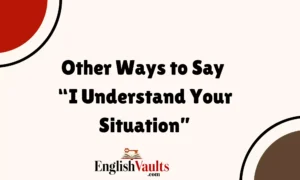In professional and personal communication, apologizing for short notice is a common necessity. Whether it’s about scheduling a meeting, changing plans, or requesting a favor, we often find ourselves in situations where we have to reach out to others with minimal lead time. It’s essential to express our regret for the inconvenience while also maintaining a positive tone. Finding alternative phrases not only enhances our communication but also shows respect for the recipient’s time and feelings. In this article, we’ll explore 24 effective alternatives to saying “Sorry for the short notice,” ensuring your message remains courteous and professional.
List of 24 Other Ways to Say “Sorry for the Short Notice”
- I Appreciate Your Understanding
- Thank You for Your Flexibility
- I Hope You Can Accommodate
- I Know This Is Last Minute
- I Appreciate Your Patience
- Thank You for Your Consideration
- I Understand If This Isn’t Possible
- I Regret the Late Notice
- Apologies for the Tight Timeline
- I Wish I Had More Time to Notify You
- I Know This Is Unexpected
- I Appreciate Your Quick Response
- Sorry for the Inconvenience
- I Hope This Doesn’t Cause Too Much Trouble
- Thank You for Your Understanding
- I Appreciate Your Cooperation
- My Apologies for the Late Request
- I Understand If You’re Unable to Help
- I Appreciate Your Support Despite the Short Notice
- I Regret the Last-Minute Change
- I’m sorry for the Rush
- Thank You for Your Help on Such Short Notice I Value Your Flexibility
- I Apologize for the Hasty Notice
1. I Appreciate Your Understanding
When you have to make a last-minute request, starting with gratitude can soften the impact. Saying, “I appreciate your understanding” conveys that you recognize the inconvenience caused by your short notice and value the recipient’s flexibility.
Example Scenario: Jerry needed to reschedule a meeting with Tomi and realized he hadn’t given much notice. He sent an email saying: “Hi Tomi, I hope you’re doing well. I need to reschedule our meeting, and I apologize for the short notice. I appreciate your understanding and look forward to finding a new time that works for both of us.”
2. Thank You for Your Flexibility
This phrase acknowledges that the other person is adjusting their schedule for you. It helps to maintain a positive tone while expressing your regret.
Example Scenario: Jerry reached out to Tomi to ask for a last-minute favor: “Hi Tomi, I know this is short notice, but could you help me with a project today? Thank you for your flexibility; it means a lot to me!”
3. I Hope You Can Accommodate
Expressing hope that the recipient can make the necessary adjustments adds a polite touch to your request.
Example Scenario: Jerry had to change a dinner reservation last minute and sent a text to Tomi: “Hey Tomi, I’m sorry about the last-minute change, but I need to adjust our dinner plans. I hope you can accommodate this new timing!”
4. I Know This Is Last Minute
By openly acknowledging the timing of your request, you can set a respectful tone right from the start.
Example Scenario: When Jerry needed to cancel a lunch date with Tomi, he wrote: “Hi Tomi, I know this is last minute, but I won’t be able to make it to lunch tomorrow. I’m sorry for the inconvenience!”
5. I Appreciate Your Patience
This phrase reflects your understanding of the other person’s position and conveys appreciation for their cooperation.
Example Scenario: Jerry sent a quick email to Tomi regarding a project update: “Hi Tomi, I wanted to give you an update, but I’ve been tied up. I appreciate your patience as I finalize the details!”
6. Thank You for Your Consideration
This phrase is polite and respectful, recognizing the other person’s efforts to accommodate your request.
Example Scenario: Jerry needed a colleague’s input on a presentation with little notice and sent this message: “Hi Tomi, I know this is a lot to ask on short notice, but could you provide your feedback on my presentation? Thank you for your consideration!”
7. I Understand If This Isn’t Possible
By recognizing that your request may be inconvenient, you demonstrate empathy and respect for the other person’s time.
Example Scenario: Jerry needed a favor from Tomi but was aware of the short notice: “Hi Tomi, I understand if this isn’t possible, but could you assist me with the project today? I appreciate any help you can offer!”
8. I Regret the Late Notice
This straightforward acknowledgment can help express your feelings without excessive elaboration.
Example Scenario: Jerry needed to cancel a team meeting and emailed Tomi: “Hi Tomi, I regret the late notice, but I have to cancel our team meeting scheduled for tomorrow. I apologize for any inconvenience this may cause.”
9. Apologies for the Tight Timeline
Using this phrase indicates a recognition of the urgency or pressure caused by your request.
Example Scenario: Jerry needed to finalize an event plan and sent an email to Tomi: “Hi Tomi, apologies for the tight timeline, but I need your input on the event plan by the end of the day. Thank you for your help!”
10. I Wish I Had More Time to Notify You
This phrase emphasizes your regret for not being able to give more notice and reflects your desire to respect the other person’s schedule.
Example Scenario: Jerry needed to reschedule a doctor’s appointment and texted Tomi: “Hi Tomi, I wish I had more time to notify you, but I have to reschedule my appointment. I hope we can find another time soon.”
11. I Know This Is Unexpected
Acknowledging that your request is sudden can help prepare the recipient for the news.
Example Scenario: Jerry had to ask Tomi for an urgent meeting: “Hi Tomi, I know this is unexpected, but could we meet to discuss the project today? Your input would be invaluable!”
12. I Appreciate Your Quick Response
This phrase is useful when you need a prompt reply and acknowledges the recipient’s willingness to assist.
Example Scenario: Jerry reached out to Tomi for immediate feedback on a proposal: “Hi Tomi, I appreciate your quick response to my request for feedback. I know it’s last minute, and I’m grateful for your help!”
13. Sorry for the Inconvenience
A direct acknowledgment of the trouble your request may cause is often appropriate.
Example Scenario: Jerry had to cancel plans with Tomi and sent an email saying: “Hi Tomi, I’m sorry for the inconvenience, but I have to cancel our dinner plans. Let’s reschedule soon!”
14. I Hope This Doesn’t Cause Too Much Trouble
This phrase shows your awareness of the potential disruption your request may cause.
Example Scenario: Jerry needed Tomi’s input on a presentation with little notice: “Hi Tomi, I hope this doesn’t cause too much trouble, but could you review my slides before the meeting? I’d appreciate your insights!”
15. Thank You for Your Understanding
This phrase acknowledges the recipient’s patience and is a respectful way to request their assistance.
Example Scenario: Jerry texted Tomi about an event change: “Hey Tomi, thank you for your understanding regarding the last-minute change to our event schedule. It’s greatly appreciated!”
16. I Appreciate Your Cooperation
By thanking the recipient for their cooperation, you show respect for their willingness to help despite the short notice.
Example Scenario: Jerry reached out to Tomi for a last-minute change in plans: “Hi Tomi, I need to adjust our meeting time. I appreciate your cooperation in this matter!”
17. My Apologies for the Late Request
This phrase is straightforward and directly addresses the issue at hand.
Example Scenario: Jerry needed to send out a reminder about an upcoming meeting: “Hi Tomi, my apologies for the late request, but I wanted to remind you about the meeting tomorrow. Thank you!”
18. I Understand If You’re Unable to Help
This phrase reinforces your respect for the recipient’s boundaries and willingness to assist.
Example Scenario: Jerry had to ask Tomi for help on a project with little notice: “Hi Tomi, I understand if you’re unable to help, but I could use your insights on this project. Thanks for considering it!”
19. I Appreciate Your Support Despite the Short Notice
This phrase conveys gratitude for the recipient’s willingness to support you under time constraints.
Example Scenario: Jerry needed Tomi’s help for a presentation and sent an email: “Hi Tomi, I appreciate your support despite the short notice. Your feedback would help me!”
20. I Regret the Last-Minute Change
Using this phrase allows you to express regret without overly apologizing, making it sound sincere yet respectful.
Example Scenario: Jerry needed to change a work assignment and texted Tomi: “Hi Tomi, I regret the last-minute change to your assignment. I appreciate your flexibility!”
21. I’m sorry for the Rush
This phrase conveys your acknowledgment of the pressure the other person might feel due to your request.
Example Scenario: Jerry reached out to Tomi about a deadline: “Hi Tomi, I’m sorry for the rush, but I need your approval on this document by the end of the day. Thank you for your help!”
22. Thank You for Your Help on Such Short Notice
Acknowledging the other person’s efforts can foster goodwill and cooperation.
Example Scenario: Jerry texted Tomi about helping with an urgent task: “Hey Tomi, thank you for your help on such short notice. I truly appreciate it!”
23. I Value Your Flexibility
Expressing gratitude for the other person’s willingness to adapt is always a good approach.
Example Scenario: Jerry had to shift a meeting time and reached out to Tomi: “Hi Tomi, I value your flexibility in accommodating this change. Let’s confirm a new time that works for both of us!”
24. I Apologize for the Hasty Notice
This phrase conveys a sense of urgency while still maintaining professionalism.
Example Scenario: Jerry needed to finalize a project detail and emailed Tomi: “Hi Tomi, I apologize for the hasty notice, but I need your feedback on this project. Your insights are crucial, and I appreciate your help!”
Conclusion
Finding alternative phrases to say “Sorry for the short notice” can significantly enhance your communication skills. By expressing gratitude and acknowledging the other person’s time and efforts, you maintain professionalism and foster positive relationships. Whether it’s in a business setting or personal interactions, these alternatives can help convey your sincerity and respect. As you navigate conversations that require a last-minute touch, consider using these phrases to ensure your message is both polite and effective.
By incorporating these 24 alternative expressions into your vocabulary, you can communicate more effectively, even when time is not on your side. These phrases not only help in smoothing over potentially awkward situations but also convey that you value the other person’s time and effort. Whether you are crafting an email, sending a quick message, or speaking face-to-face, having a variety of options at your disposal can make all the difference.










